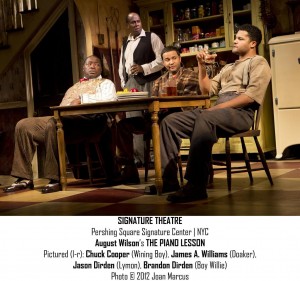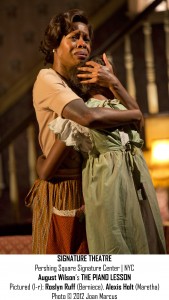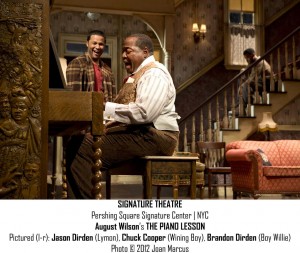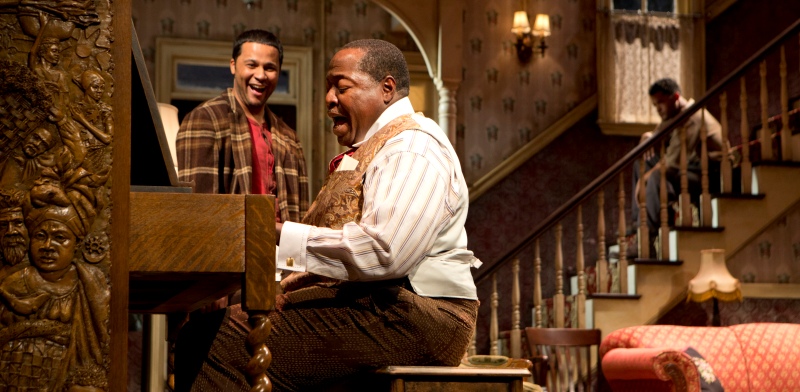 The text of August Wilson’s plays are less scripts than they are scores. Even when his characters are not singing, they are maneuvering their language through a free form prose poetry that blurs the distinction between word and song. The effect is to give the play a sense of ritual, moving its events out of their seemingly everyday context and into the space of ceremony.
The text of August Wilson’s plays are less scripts than they are scores. Even when his characters are not singing, they are maneuvering their language through a free form prose poetry that blurs the distinction between word and song. The effect is to give the play a sense of ritual, moving its events out of their seemingly everyday context and into the space of ceremony.
In THE PIANO LESSON, now receiving a masterfully powerful revival at The Signature Theatre, that ceremony is a blues séance determined to exercise the demons of slavery and family strife, ghosts that will not leave without great struggle.
THE PIANO LESSON belongs to Wilson’s “Century Cycle,” a career-spanning project in which he wrote one play to represent the African-American experience in each decade of the twentieth century. It is a remarkable and insightful project that traces a mostly arduous journey out of the shadows of slavery and into a fight to establish community, accountability, and the strength to stand upright and proud in harsh social terrain.
Set in 1936, THE PIANO LESSON (which earned the playwright his second Pulitzer) occupies a heated liminal space between the reality of slavery and the struggles for independence. Defined as they are by family and genealogy, the play and its characters—separated from slavery by only a generation or two—are in constant dialogue with the ghosts of slaves and their owners. As such, the play investigates the struggle of family and community to move forward while reconciling the horrors of the not-so-distant past. Nobody in this play had been born into slavery, but they bear its deep scars in the proximity of their family history, and they are attended constantly by its ghosts. The play stages a tenuous struggle to remember the pain of the past while moving beyond its immobilizing oppression.
 Set in the Pittsburgh home of Doaker (James A. Williams) and his niece Berniece (Roslyn Ruff), the play opens as Berniece’s brother Boy Willie (Brandon J. Dirden) arrives from his home in Mississippi with a family friend Lymon (Jason Dirden). The two have driven up from the south in the hopes of creating a financial windfall by selling a truckload of watermelons to rich northerners. Boy Willie needs money because he has the opportunity to buy farm land that belonged to the recently deceased Sutter, whose grandfather owned the ancestors of Boy Willie and the rest of the play’s central family. Boy Willie figures that he has saved one part of the money to buy the farm, that he can make a second part on watermelon profits, and that the final part can come from selling the piano he and his sister inherited from their father.
Set in the Pittsburgh home of Doaker (James A. Williams) and his niece Berniece (Roslyn Ruff), the play opens as Berniece’s brother Boy Willie (Brandon J. Dirden) arrives from his home in Mississippi with a family friend Lymon (Jason Dirden). The two have driven up from the south in the hopes of creating a financial windfall by selling a truckload of watermelons to rich northerners. Boy Willie needs money because he has the opportunity to buy farm land that belonged to the recently deceased Sutter, whose grandfather owned the ancestors of Boy Willie and the rest of the play’s central family. Boy Willie figures that he has saved one part of the money to buy the farm, that he can make a second part on watermelon profits, and that the final part can come from selling the piano he and his sister inherited from their father.
But Berniece has no intention of allowing the piano to be sold, and the rest of the family, Doaker and his brother Whining Boy (Chuck Cooper), aren’t too crazy about the prospect either. For the piano used to belong to the Sutters, and its body was hand-carved by Boy Willie’s great grandfather as a kind of totem to tell the family’s history. What’s more, the family owns it now only because Boy Willie’s father stole it out of the Sutter home, an offence for which he was hunted down and killed. Berniece insists that the piano will not go anywhere because it is infused with the tears and blood of their family history, while Boy Willie sees the piano as a ticket to advancement in the world. The play traces the rising tension over the piano’s future as family allegiances begin to splinter.
THE PIANO LESSON, then, is a deeply introspective examination of a family straddling a tumultuous line between the past and the future, quarrelling over whether to dwell with the ghosts of history or to exercise them as a means to a rising future.
 Director Ruben Santiago-Hudson has proven himself again and again to have a powerfully insightful eye and ear for the heart of August Wilson, and he conducts the séance of this PIANO LESSON with a nuanced balance of subtlety and vigor. The play and its long speeches are never rushed, as Santiago-Hudson allows his actors the space to dedicate themselves to storytelling (Williams’s Doaker shines particularly in this aspect), but the moments of high tension and conflict are equally as free to boil over. It is an evening of rhythmic rising and falling, fully embracing Wilson’s blues.
Director Ruben Santiago-Hudson has proven himself again and again to have a powerfully insightful eye and ear for the heart of August Wilson, and he conducts the séance of this PIANO LESSON with a nuanced balance of subtlety and vigor. The play and its long speeches are never rushed, as Santiago-Hudson allows his actors the space to dedicate themselves to storytelling (Williams’s Doaker shines particularly in this aspect), but the moments of high tension and conflict are equally as free to boil over. It is an evening of rhythmic rising and falling, fully embracing Wilson’s blues.
This rhythm is most alive in the wonderful musical interludes, including Cooper’s two turns at the piano, but its apotheosis is when Doaker, Whining Boy, Lyman, and Boy Willie sing a four-part a capella blues number while pounding out a beat around the kitchen table. This moment captures masterfully the blues’ engagement with and expression of pain and despair in search of a momentary release, an aesthetic so central to Wilson’s work.
In a production rife with strong performances, Brandon J. Dirden’s powerful Boy Willie deserves special attention. Boy Willie embodies this play’s conflict between history and the drive for the future most fully, a conflict that Dirden’s kinetically physical performance allows to enflame this character. Dirden bounds around the stage with an energy that seems to scream for release, as his determined speeches seize upon Boy Willie’s obstinate insistence to move forward in his life. The character with a drive for more out of life than society will allow him is an important favorite of Wilson’s, and Dirden here captures that character’s yearning at its most robust and lively.
Like its playwright, THE PIANO LESSON never shies from indulging the ghosts of history that demand reckoning, but neither does it give in to those ghosts. It is a play that looks to the rituals of blues, family history, and personal ambition as a means to escape the oppressive shadow of slavery and its violent aftermath, suggesting ultimately that the only way to exercise the demons of the past might very well be to engage them directly.
THE PIANO LESSON
by August Wilson
Directed by Ruben Santiago-Hudson
EXTENDED AGAIN–running through January 13, 2013
Signature Theatre Company
The Pershing Square Signature Center
480 West 42nd Street
New York, NY 10036
212-244-7529
http://www.signaturetheatre.org/


